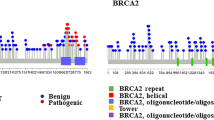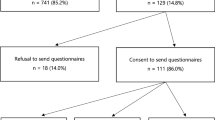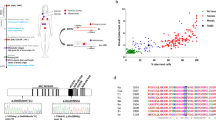Abstract
The identification of women with a high probability of being carriers of pathogenic BRCA mutation is not straightforward and a major improvement would be the availability of markers of mutations that could be directly evaluated in individuals asking for genetic testing. The FMR1 gene testing was recently proposed as a candidate prescreening tool because an association between BRCA pathogenic mutations and FMR1 genotypes with ‘low alleles’ (CGG repeat number <26) was observed. To confirm this hypothesis, we evaluated the distribution of FMR1 alleles and genotypes between BRCA mutation carriers and non-carriers in a cohort of 147 Italian women, free of cancer or affected by breast and/or ovarian cancer, who were tested for the presence of BRCA mutation in a clinical setting. The distribution of FMR1 CGG repeat numbers in the two groups was similar (lower allele median/mean were 30/27.4 and 30/27.9, respectively; Mann–Whitney test P=0.997) and no difference in the FMR1 genotype distribution was present (χ2=0.503, d.f.=2, P=0.78). This result is in contrast with literature data and suggests that FMR1 genetic testing is not a candidate BRCA prescreening tool.
Similar content being viewed by others
Log in or create a free account to read this content
Gain free access to this article, as well as selected content from this journal and more on nature.com
or
References
Amir E, Freedman OC, Seruga B, Evans DG : Assessing women at high risk of breast cancer: a review of risk assessment models. J Natl Cancer Inst 2010; 102: 680–691.
Oktay K, Kim JY, Barad D, Babayev SN : Association of BRCA1 mutations with occult primary ovarian insufficiency: a possible explanation for the link between infertility and breast/ovarian cancer risks. J Clin Oncol 2010; 28: 240–244.
Willemsen R, Levenga J, Oostra BA : CGG repeat in the FMR1 gene: size matters. Clin Genet 2011; 80: 214–225.
Bretherick KL, Fluker MR, Robinson WP : FMR1 repeat sizes in the gray zone and high end of the normal range are associated with premature ovarian failure. Hum Genet 2005; 117: 376–382.
Gleicher N, Weghofer A, Oktay K, Barad D : Relevance of triple CGG repeats in the FMR1 gene to ovarian reserve. Reprod Biomed Online 2009; 19: 385–390.
Gleicher N, Weghofer A, Barad DH : Ovarian reserve determinations suggest new function of FMR1 (fragile X gene) in regulating ovarian ageing. Reprod Biomed Online 2010; 20: 768–775.
Weghofer A, Tea MK, Barad DH et al: BRCA1/2 mutations appear embryo-lethal unless rescued by low (CGG n<26) FMR1 sub-genotypes: explanation for the ‘BRCA paradox’? PLoS One 2012; 7: e44753.
Peprah E : Fragile X syndrome: the FMR1 CGG repeat distribution among world populations. Ann Hum Genet 2012; 76: 178–191.
Plon SE, Eccles DM, Easton D et al: Sequence variant classification and reporting: recommendation for improving the interpretation of cancer susceptibility genetic test results. Hum Mutat 2008; 29: 1282–1291.
Fu YH, Kuhl DP, Pizzuti A et al: Variation of the CGG repeat at the fragile X site results in genetic instability: resolution of the Sherman paradox. Cell 1991; 67: 1047–1058.
Acknowledgements
This work was supported by the Italian Association for Research on Cancer (AIRC) (Project IG 5706 2008). We thank Dr Francesca Faravelli for helpful discussions on the ethical implications of the study.
Author information
Authors and Affiliations
Corresponding author
Ethics declarations
Competing interests
The authors declare no conflict of interest.
Additional information
Supplementary Information accompanies this paper on European Journal of Human Genetics website
Supplementary information
Rights and permissions
About this article
Cite this article
Ricci, M., Pennese, L., Gismondi, V. et al. The FMR1 CGG repeat test is not a candidate prescreening tool for identifying women with a high probability of being carriers of BRCA mutations. Eur J Hum Genet 22, 280–282 (2014). https://doi.org/10.1038/ejhg.2013.193
Received:
Revised:
Accepted:
Published:
Issue date:
DOI: https://doi.org/10.1038/ejhg.2013.193
Keywords
This article is cited by
-
Is Low FMR1 CGG Repeat Length in Males Correlated with Family History of BRCA-Associated Cancers? An Exploratory Analysis of Medical Records
Journal of Genetic Counseling (2017)
-
Do BRCA1/2 mutations and low FMR1 alleles interact or not?
European Journal of Human Genetics (2014)
-
BRCA1/2 mutations and FMR1 alleles are randomly distributed: a case control study
European Journal of Human Genetics (2014)



